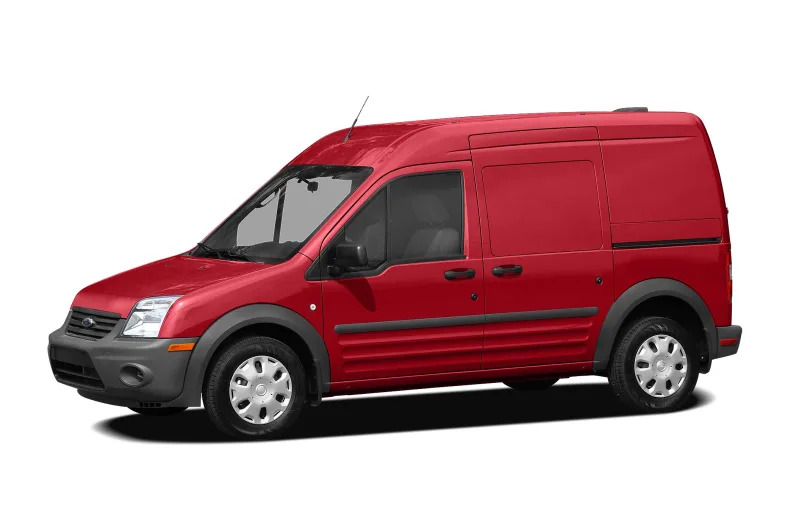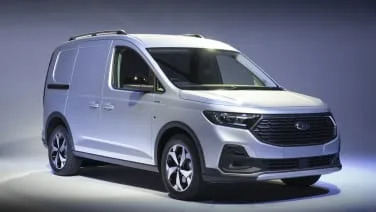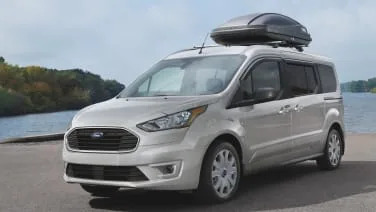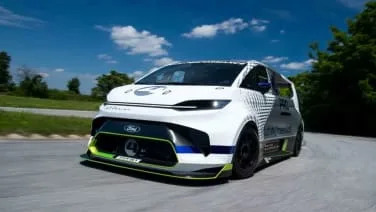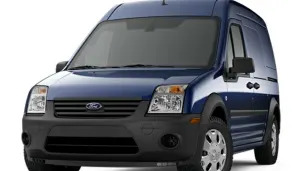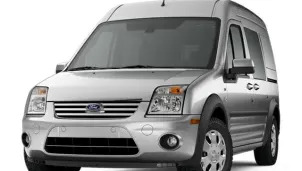2010 Ford Transit Connect
2010 Ford Transit Connect – Click above for high-res image gallery After relying on full-size E-series vans for commercial cargo carrying since the dawn of time, Ford is finally ready to offer North American businesses a more practical alternative. The Transit Connect is a compact, purpose-built van that's been available overseas since 2002, and Ford has sold more than 600,000 of the squat little haulers to businesses abroad over the past seven years. The company hopes that what's good for Europe is good for the States, so the first batch of U.S.-spec models are on their way to dealerships as you read this. While the E-series vans are more than capable of carrying out their prescribed duties, for most, it's like using a sledgehammer to push a tack into a cork board. The Big-Es were simply more vehicle than necessary for most small businesses, especially those operating locally, delivering flowers, catering and plumbing. That's where the Transit Connect comes in. %Gallery-66334% Photos Copyright ©2009 Sam Abuelsamid / Weblogs, Inc. A panel van version of the Ford Windstar/Freestar was actually produced for commercial customers from the mid-'90s until it was discontinued earlier this decade. The reworked family haulers never sold in large numbers, however, and weren't particularly optimized for the task. As gas prices spiked in 2007 and 2008, Ford saw a market for something smaller than the E-series, but bigger than the Chevrolet HHR panel van. The Transit Connect is just the ticket. Unlike the Windstar, the Transit Connect was specifically developed as a commercial vehicle. It has a beefier chassis designed to withstand the rigors of daily business use and Ford has a different testing regime for its commercial and consumer vehicles. With a high strength steel front cross-member and extra side cross-members, the Transit Connect endured Ford's rigid durability testing and walked away unscathed. It's a stout runabout and a testament to Ford's engineering abilities. The Transit Connect was designed to endure the rigors of operation in urban environments. Among the problems that city drivers regularly encounter are minor fender benders, so the TC is equipped with a rear bumper made of rolled steel designed to absorb the energy of rear-end impacts so prevalent in vehicles lacking rear windows. On the topic of driving, anyone who's spent time behind the wheel of a full-size van understands the joys of body roll, pitch, a bouncy ride and lifeless steering. Thankfully, the Transit Connect is mercilessly devoid of the these unsavory characteristics. Although the TC does not share a platform with any of FoMoCo's cars, its layout is more car-like than truck-like, which pays dividends in the driving department. Our brief time behind the wheel (What, you were expecting a full-on track test?) didn't give us an opportunity to flog the Transit Connect within an inch of its life, but the steering wheel -- adjustable for both reach and angle -- was reasonably well weighted and provided adequate feedback. The transverse, front-engine, front-wheel-drive layout and uni-body construction means there …
Full Review
2010 Ford Transit Connect – Click above for high-res image gallery After relying on full-size E-series vans for commercial cargo carrying since the dawn of time, Ford is finally ready to offer North American businesses a more practical alternative. The Transit Connect is a compact, purpose-built van that's been available overseas since 2002, and Ford has sold more than 600,000 of the squat little haulers to businesses abroad over the past seven years. The company hopes that what's good for Europe is good for the States, so the first batch of U.S.-spec models are on their way to dealerships as you read this. While the E-series vans are more than capable of carrying out their prescribed duties, for most, it's like using a sledgehammer to push a tack into a cork board. The Big-Es were simply more vehicle than necessary for most small businesses, especially those operating locally, delivering flowers, catering and plumbing. That's where the Transit Connect comes in. %Gallery-66334% Photos Copyright ©2009 Sam Abuelsamid / Weblogs, Inc. A panel van version of the Ford Windstar/Freestar was actually produced for commercial customers from the mid-'90s until it was discontinued earlier this decade. The reworked family haulers never sold in large numbers, however, and weren't particularly optimized for the task. As gas prices spiked in 2007 and 2008, Ford saw a market for something smaller than the E-series, but bigger than the Chevrolet HHR panel van. The Transit Connect is just the ticket. Unlike the Windstar, the Transit Connect was specifically developed as a commercial vehicle. It has a beefier chassis designed to withstand the rigors of daily business use and Ford has a different testing regime for its commercial and consumer vehicles. With a high strength steel front cross-member and extra side cross-members, the Transit Connect endured Ford's rigid durability testing and walked away unscathed. It's a stout runabout and a testament to Ford's engineering abilities. The Transit Connect was designed to endure the rigors of operation in urban environments. Among the problems that city drivers regularly encounter are minor fender benders, so the TC is equipped with a rear bumper made of rolled steel designed to absorb the energy of rear-end impacts so prevalent in vehicles lacking rear windows. On the topic of driving, anyone who's spent time behind the wheel of a full-size van understands the joys of body roll, pitch, a bouncy ride and lifeless steering. Thankfully, the Transit Connect is mercilessly devoid of the these unsavory characteristics. Although the TC does not share a platform with any of FoMoCo's cars, its layout is more car-like than truck-like, which pays dividends in the driving department. Our brief time behind the wheel (What, you were expecting a full-on track test?) didn't give us an opportunity to flog the Transit Connect within an inch of its life, but the steering wheel -- adjustable for both reach and angle -- was reasonably well weighted and provided adequate feedback. The transverse, front-engine, front-wheel-drive layout and uni-body construction means there …
Hide Full Review
Hide Full Review
Retail Price
$21,185 - $22,755
MSRP / Window Sticker Price
| Engine | 2.0L I-4 |
| MPG | Up to 22 city / 25 highway |
| Seating | 2 Passengers |
| Transmission | 4-spd auto w/OD |
| Power | 136 @ 6300 rpm |
| Drivetrain | front-wheel |
| Curb Weight | 3,360 - 3,425 lbs |
Smart Buy Program is powered by 

